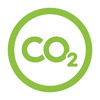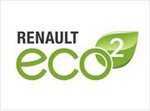Title

"The vehicle emits less than 140g/km of CO2 or operates on biofuels (in France), on E85 ethanol or on B30 biodiesel"
CO2 is the main culprit behind the greenhouse effect that threatens climate change. Through the use of fossil fuel, motor vehicles release large amounts of CO2 into the atmosphere.
Vehicles that emit less than 140g / km of greenhouse gases consume at least 47.9 mpg for a petrol engine or 53.3 mpg for a diesel engine.
Biofuels help reduce CO2 emissions as the plants used to create them absorb the CO2 in the atmosphere through photosynthesis.

Carbon dioxide (CO2) emissions and energy consumption
CO2 is the main culprit behind the greenhouse effect that threatens climate change. In consuming corresponding amounts of fossil fuel, motor vehicles release large amounts of CO2 into the atmosphere.
Renault pursues a number of major research initiatives to reduce these emissions.• To start with, Renault strives to minimize CO2 emissions from its gasoline and diesel
engines. This problem is tackled from many different angles, including optimized fuel
combustion, lightweight vehicle design, and reducing friction between moving parts.
Improvements in all these areas help reduce fuel consumption, and thereby CO2 emissions.
• Vehicle aerodynamics also has a bearing on fuel consumption. Recent
developments in digital aerodynamic modelling provide engineers with valuable
insights into the impact of design choices on fuel consumption.
• Renault takes part in ambitious research programs on alternative energies capable
of eventually taking over from classic petroleum fuels, either in the near future (for
biomass fuels and battery-electric vehicles) or within a longer time-frame (for fuel
cells to power electric vehicles).









